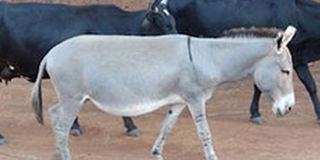Fears of donkey meat sale as six carcasses are found at quarry

A donkey walks among cows. Fears of donkey meat finding its way to the dinner table are high in Nakuru after six carcasses were found at a quarry. Photo/FILE
What you need to know:
- The beasts of burden were slaughtered on Sunday night at Nakuru’s Teachers Estate and their flesh taken away.
Fears of donkey meat finding its way to the dinner table are high in Nakuru after six carcasses were found at a quarry on Monday.
The beasts of burden were slaughtered on Sunday night at Nakuru’s Teachers Estate and their flesh taken away.
The owners of the animals, which had been reported missing a day ago from Nakuru’s Mawanga Estate, were shocked to find their remains at Hyrax area.
Bones, skins, hoofs, dung and pools of blood were all that were left of the animals, with a nauseating smell engulfing the scene.
“I had tethered the animals next to my house yesterday (Sunday) evening, but in the morning they were missing,” Mr Francis Waititu, who lost two donkeys, said.
BIG BLOW
He said he reported the matter to the police after a search for his main source of livelihood proved futile.
Another farmer, Mr Stephen Kamachu, said the thieves had dealt him a big blow because he depended on the animals for transport.
The theft, slaughter and sale of donkey meat is increasingly becoming a lucrative business in Nakuru, with at least five beasts of burden being stolen and slaughtered every week.
“We are asking the concerned government agencies to take action against those behind this illegal trade, which is on the increase,” a resident told Nation.
Nakuru North district veterinary officer Githui Kaba said it was illegal to sell donkey meat to the public without informing them what they are buying.
“We will work with the relevant government agencies to arrest those behind this illegal business. Though donkey meat is fit for human consumption, it should not be sold to customers without letting them know what they are buying,” he said.
The discovery of donkey meat in Naivasha Town early this year prompted the government to form a task force to investigate the illegal business in the county and the entire Rift Valley region.
Members of the team were drawn from the Kenya Wildlife Service, Department of Public Health and Kenya Police.




